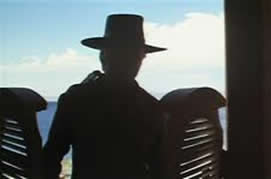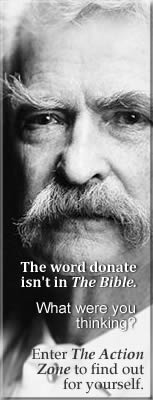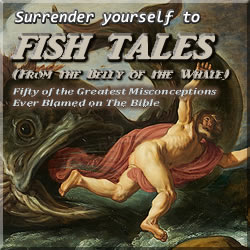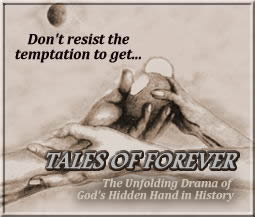The Wild Child
Scene One
Had it not been for a select group of forward-thinking pioneers, the motion picture industry at the turn of the twentieth century could have never grown beyond its perennially juvenile state to ultimately blossom into what we now view as a patently modern art form. Thanks to these uniquely insightful men and women, who forged this new medium of expression by the sheer dint of their personal charisma and imagination, these new-fangled movies steadily grew from their unsure infancy to full-blown maturity in a matter of but a few decades; and they did so not by repeating the efforts of their timid contemporaries who insisted on producing an endless stream of movies depicting everyday people doing everyday things, but by boldly infusing their tales with the dramatic elements of classical narratives which had been handed down since time immemorial.
Having to contend with a public that was no longer content with the simplistic storylines that early film producers had been churning out, one of the earliest examples of the new Hollywood mentality was that of the head of Paramount Pictures, Adolph Zukor, who established his Famous Plays by Famous Players in 1912. Spurred on by earlier successes such as Edwin S. Porter’s 1904 landmark film entitled The Great Train Robbery—the first Western to tell a real story—Zukor clearly interpreted the handwriting that was on the wall. In his view, unless audiences were provided the kinds of stories that previous generations of theatergoers had already come to expect, the motion picture industry was doomed to failure. If their beloved child did not grow up fast, it would inevitably die an ignominious death. Fortunately for all involved, we all know quite well how the story ends. The child, in fact, survived, and went on to live a happy and full life. All thanks to the genius of the movie moguls like Adolph Zukor who nurtured the child of destiny, right?
Story Continues Below
To watch author and historian W. Kent Smith discuss the contents of his book On Earth as It is On Heaven, at the Sacred Word Revealed Conference ‘23, hosted by Zen Garcia, CLICK BELOW.
This, then, will comprise the central premise of this present work, that of attempting to interpret the irrevocable relationship between the brilliant yet oft time fallible geniuses who capture the proverbial lightning in a bottle when they produce what is eventually deemed a classic and that of the nameless, faceless ones, known quite reticently as the audience, who holds such power as to ultimately decide what is considered to be a smash hit or a miserable flop. The task will naturally be a difficult one, a task which has until now been one that is often overlooked; but, in the end, it will be a task that will ultimately shed new light on the history of Hollywood, not to mention our understanding of the role of the all-too-human component that comprises that of the role of the audience, without which there would never be a single reason for being in the life of anyone who comprises the vast company of players so indispensible in the creation of any motion picture.
Having said all that, I would now like to return to my initial point that Hollywood owes its very existence to the dramatic narratives found in The Bible. Fortunately, one need not look any further than in the earliest decades of motion picture history. Already having established one of our heroes in this story, Adolph Zukor, let us remember how our story in regard to him began, namely how this one man, more than anyone else in those early days, came to the realization that “movies only seemed like novelties because they had been treated as novelties.” According to Neal Gabler, in his penetrating study An Empire of their Own: How the Jews Invented Hollywood, it was “Adolph Zukor who sensed more than anyone else that their potential was so much greater. What Zukor was proposing was a radical change in the basic conception of motion pictures. He was a zealot, and now he became almost messianic on the subject of longer, better films.”
And in the face of every obstacle that hindered his dream from becoming a reality, Zukor ultimately triumphed in imposing his will upon the development of the motion picture industry, in spite of the fact that many of his detractors felt that Adolph’s dogmatism was a sure sign that he was nothing more than a megalomaniac. But if the derogatory appraisals of a man by his rivals are to be believed or not, one need only consider the facts of Zukor’s upbringing as a disenfranchised immigrant far removed from his native Hungary. All that one needs to understand is what every biographer reveals about this boy who grew to be a man in turn-of-the century America, and one will clearly see how this one man, out of all the moguls of his day, can be rightly accredited in helping to invent the legacy we now know as Hollywood. Even the newspapers of his time presciently announced that it was, in fact, “his formation of the Famous Players which initiated the single greatest phase in the advancement of the art of the silent drama.”
In many ways, Zukor’s life story reads like a Dickensian tale of deprivation and tragedy, yet, as in all such tales, the hero picks himself up by the bootstraps in order to ultimately triumph over life and all its inherent difficulties. In writing about himself, Zukor revealed with sublime melancholy, “I had no father and I had no mother. I was alone. But no sooner had I put my foot on American soil than I was a newborn person.” As Gabler describes it, “Zukor’s is really the story of a man who had been emptied out in childhood, who had lost or been deprived of love and security, and who then set about to fill himself back up again.” Born to a Jewish family in 1873 Hungary, both of his parents died by the time Adolph was just eight years old. Forced to live with their sternly scholastic uncle, he and his older brother became thoroughly immersed in Judaism. But, whereas his brother went on to become a rabbi, Adolph, however, refused to involve himself in the intricacies of rabbinical law. “What I was interested in,” he would later say, “was The Bible.” What Zukor was confessing to was that he was not in the least bit interested in the minutiae of the endless maze of laws and theories that the more scholarly minds of the day spent endless hours poring over. What Zukor found so fascinating about the book of books was “the stories contained in The Bible…the individuals. It was their lives that fascinated me.” No wonder that Adolph Zukor, more than any of his contemporaries, would seek to develop dramas for his motion pictures that mirrored the very kinds of stories that he had grown up with, as he was mentored so faithfully by his school’s headmaster, a man by the name of Samuel Rosenberg, who taught the lad everything he knew about The Bible, explaining what it meant, giving him private lessons at every opportunity, and showing him the kind of concern that his own uncle had deprived him of, considering Adolph’s disdain for the more arcane aspects of The Talmud.





